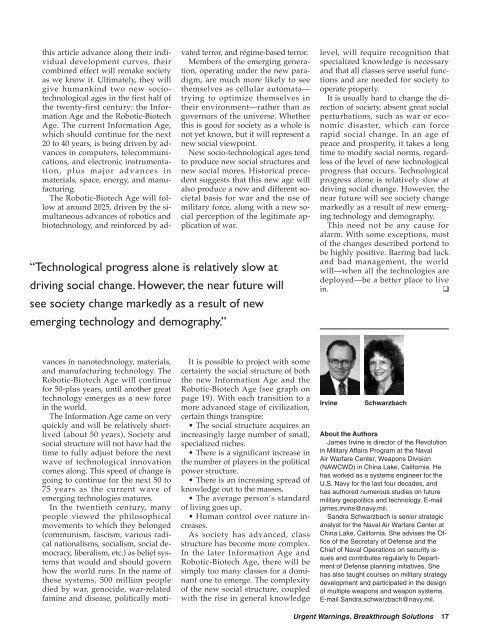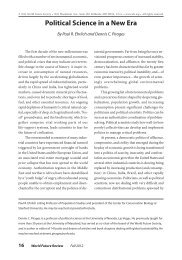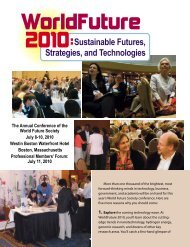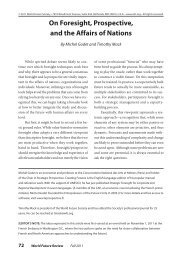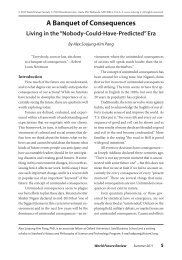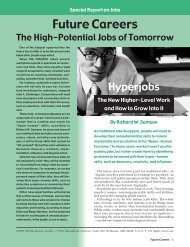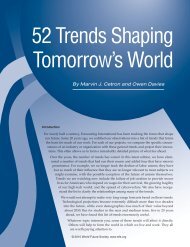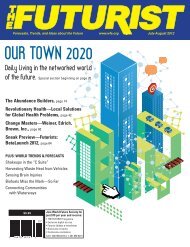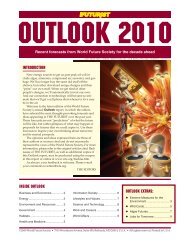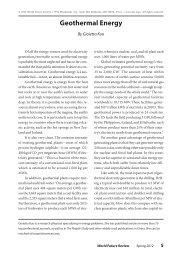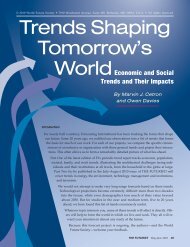Urgent Warnings, Breakthrough Solutions, Second Edition
Urgent Warnings, Breakthrough Solutions, Second Edition
Urgent Warnings, Breakthrough Solutions, Second Edition
You also want an ePaper? Increase the reach of your titles
YUMPU automatically turns print PDFs into web optimized ePapers that Google loves.
vated terror, and régime-based terror.<br />
Members of the emerging generation,<br />
operating under the new paradigm,<br />
are much more likely to see<br />
themselves as cellular automata—<br />
trying to optimize themselves in<br />
their environment—rather than as<br />
governors of the universe. Whether<br />
this is good for society as a whole is<br />
not yet known, but it will represent a<br />
new social viewpoint.<br />
New socio-technological ages tend<br />
to produce new social structures and<br />
new social mores. Historical precedent<br />
suggests that this new age will<br />
also produce a new and different societal<br />
basis for war and the use of<br />
military force, along with a new social<br />
perception of the legitimate application<br />
of war.<br />
“Technological progress alone is relatively slow at<br />
driving social change. However, the near future will<br />
see society change markedly as a result of new<br />
emerging technology and demography.”<br />
level, will require recognition that<br />
specialized knowledge is necessary<br />
and that all classes serve useful functions<br />
and are needed for society to<br />
operate properly.<br />
It is usually hard to change the direction<br />
of society, absent great social<br />
perturbations, such as war or economic<br />
disaster, which can force<br />
rapid social change. In an age of<br />
peace and prosperity, it takes a long<br />
time to modify social norms, regardless<br />
of the level of new technological<br />
progress that occurs. Technological<br />
progress alone is relatively slow at<br />
driving social change. However, the<br />
near future will see society change<br />
markedly as a result of new emerging<br />
technology and demography.<br />
This need not be any cause for<br />
alarm. With some exceptions, most<br />
of the changes described portend to<br />
be highly positive. Barring bad luck<br />
and bad management, the world<br />
will—when all the technologies are<br />
deployed—be a better place to live<br />
in.<br />
❑<br />
this article advance along their individual<br />
development curves, their<br />
combined effect will remake society<br />
as we know it. Ultimately, they will<br />
give humankind two new sociotechnological<br />
ages in the first half of<br />
the twenty-first century: the Information<br />
Age and the Robotic-Biotech<br />
Age. The current Information Age,<br />
which should continue for the next<br />
20 to 40 years, is being driven by advances<br />
in computers, telecommunications,<br />
and electronic instrumentation,<br />
plus major advances in<br />
materials, space, energy, and manufacturing.<br />
The Robotic-Biotech Age will follow<br />
at around 2025, driven by the simultaneous<br />
advances of robotics and<br />
biotechnology, and reinforced by advances<br />
in nanotechnology, materials,<br />
and manufacturing technology. The<br />
Robotic-Biotech Age will continue<br />
for 50-plus years, until another great<br />
technology emerges as a new force<br />
in the world.<br />
The Information Age came on very<br />
quickly and will be relatively shortlived<br />
(about 50 years). Society and<br />
social structure will not have had the<br />
time to fully adjust before the next<br />
wave of technological innovation<br />
comes along. This speed of change is<br />
going to continue for the next 50 to<br />
75 years as the current wave of<br />
emerging technologies matures.<br />
In the twentieth century, many<br />
people viewed the philosophical<br />
movements to which they belonged<br />
(communism, fascism, various radical<br />
nationalisms, socialism, social democracy,<br />
liberalism, etc.) as belief systems<br />
that would and should govern<br />
how the world runs. In the name of<br />
these systems, 500 million people<br />
died by war, genocide, war-related<br />
famine and disease, politically moti-<br />
It is possible to project with some<br />
certainty the social structure of both<br />
the new Information Age and the<br />
Robotic-Biotech Age (see graph on<br />
page 19). With each transition to a<br />
more advanced stage of civilization,<br />
certain things transpire:<br />
• The social structure acquires an<br />
increasingly large number of small,<br />
specialized niches.<br />
• There is a significant increase in<br />
the number of players in the political<br />
power structure.<br />
• There is an increasing spread of<br />
knowledge out to the masses.<br />
• The average person’s standard<br />
of living goes up.<br />
• Human control over nature increases.<br />
As society has advanced, class<br />
structure has become more complex.<br />
In the later Information Age and<br />
Robotic- Biotech Age, there will be<br />
simply too many classes for a dominant<br />
one to emerge. The complexity<br />
of the new social structure, coupled<br />
with the rise in general knowledge<br />
Irvine<br />
Schwarzbach<br />
About the Authors<br />
James Irvine is director of the Revolution<br />
in Military Affairs Program at the Naval<br />
Air Warfare Center, Weapons Division<br />
(NAWCWD) in China Lake, California. He<br />
has worked as a systems engineer for the<br />
U.S. Navy for the last four decades, and<br />
has authored numerous studies on future<br />
military geopolitics and technology. E-mail<br />
james.irvine@navy.mil.<br />
Sandra Schwarzbach is senior strategic<br />
analyst for the Naval Air Warfare Center at<br />
China Lake, California. She advises the Office<br />
of the Secretary of Defense and the<br />
Chief of Naval Operations on security issues<br />
and contributes regularly to Department<br />
of Defense planning initiatives. She<br />
has also taught courses on military strategy<br />
development and participated in the design<br />
of multiple weapons and weapon systems.<br />
E-mail Sandra.schwarzbach@navy.mil.<br />
<strong>Urgent</strong> <strong>Warnings</strong>, <strong>Breakthrough</strong> <strong>Solutions</strong> 17


